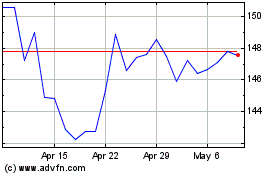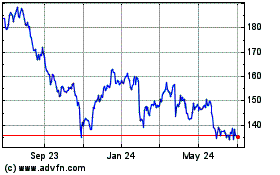Today's Logistics Report: Tracking a Vaccine; Lasting Postal Slowdown; Megaships' Broken Promise
October 23 2020 - 11:09AM
Dow Jones News
By Paul Page
Sign up: With one click, get this newsletter delivered to your
inbox.
Planning and tracking technology is forming around the sprawling
supply chain for prospective Covid-19 vaccines. Data-mining company
Palantir Technologies Inc. is helping the federal government set up
the system that will track the manufacture, distribution and
administration of Covid-19 vaccines, the WSJ's Peter Loftus and
Rolfe Winkler, even as big drugmakers continue to develop and test
hoped-for medical solutions to the pandemic. The tracking system,
dubbed Tiberius, would build on work that Palantir has been doing
for federal health officials tracking coronavirus hospitalizations.
Pharmaceutical manufacturers are already using their more focused
supply-chain technologies and visibility tools to manage the
transport progress of vaccines from sourcing to distribution. The
Tiberius platform would take data from those companies,
distributors and others involved with vaccines and integrate it
with demographic and other health data to help health authorities
make decisions on where to send doses and to track the results.
TRANSPORTATION
A new report details a dramatic and lasting slowdown in mail
delivery after former logistics executive Louis DeJoy became
postmaster general. The report by the U.S. Postal Service's
inspector general says actions Mr. DeJoy initiated or which were
accelerated after he took office in June resulted in widespread
pileups of mail. The WSJ's Rebecca Smith and Joe Palazzolo write
that the report says backups at processing facilities and post
offices still haven't been eliminated, casting a shadow over the
Postal Service because of the heightened role mail delivery plays
this year during the presidential election and the pandemic. The
problems are adding to the headaches of shippers this year as the
surge in digital commerce has stressed parcel networks. The report
said on-time delivery of first-class mail plunged below 80% in July
and was 86.8% as of Sept. 3, still well below an internal target of
96%.
TRANSPORTATION
Megaships were supposed to bring a new shine to the bottom lines
of container ship operators and stimulate a new era of fast-growing
international trade. Economist and historian Marc Levinson argues
in a WSJ essay that the opposite has occurred, with the behemoth
Emma Maersk that launched in 2006 and the larger vessels in the
ship's wake making freight transportation slower and less reliable.
Mr. Levinson, author of a new book, "Outside the Box: How
Globalization Changed from Moving Stuff to Spreading Ideas," have
helped stifle globalization by slowing the movement of industrial
commerce and undermining confidence in tightly organized supply
chains. Shippers have borne a burden by keeping more inventory,
reversing a decades-long focus on minimizing production,
transportation and inventory costs. Some shipping experts will
argue with that assessment but container lines may be more
measured. They're making big profits this year, after all,
operating with less capacity.
QUOTABLE
IN OTHER NEWS
New U.S. applications for unemployment benefits fell but remain
far above pre-pandemic peaks. (WSJ)
Sales of previously owned homes in the U.S. rose to a 14-year
high in September. (WSJ)
Turkey's currency fell to a record low against the dollar.
(WSJ)
Persian Gulf waters off Iraq have become an important waypoint
for Iranian oil smugglers looking to avoid U.S. sanctions.
(WSJ)
Walmart Inc. is suing the federal government in a pre-emptive
move against what it said is an impending opioid-related civil
lawsuit. (WSJ)
United Parcel Service Inc. plans to offer nearly 100,000 of its
workers a way to save for emergencies within its retirement plan.
(WSJ)
A California court says Uber Technologies Inc. and Lyft Inc.
must comply with an order that requires them to reclassify their
drivers as employees. (WSJ)
American Airlines Group Inc. lost $2.4 billion in the third
quarter and Southwest Airlines lost $1.2 billion despite an uptick
in passenger traffic. (WSJ)
Pandemic-driven consumer purchasing drove Unilever Ltd.'s North
American underlying sales up 9.1% in the third quarter. (WSJ)
Coca-Cola Co. expects to see growth this year in China, even as
global sales decline. (WSJ)
Gucci's third-quarter sales fell 12%, lagging other big luxury
labels. (WSJ)
Apparel retailer Gap Inc. will close about 350 U.S. stores as it
focuses on growing digital sales. (CNBC)
Huawei Technologies Inc. has stockpiled chips as it launches a
smartphone amid U.S. sanctions on the Chinese company. (Washington
Post)
Airbus SE has told suppliers it expects to boost production of
its A320neo aircraft by nearly 18% next year. (Financial Times)
Japan's Mitsubishi Heavy Industries is close to halting
development of a regional jet. (Nikkei Asian Review)
Shippers are paying record fees for empty containers because of
a steep imbalance in trade in and out of China. (Lloyd's List)
Loaded container imports into the ports of Seattle and Tacoma
reached their highest level in a year in September but were off
6.8% from last year. (Port Technology)
An investigation concludes that decaying dangerous cargo caused
the 2018 fire that heavily damaged the Maersk Honam and killed five
seafarers. (ShippingWatch)
Scorpio Bulkers Inc. is on pace to shed the last of its bulk
ships by the end of the first quarter. (TradeWinds)
Union Pacific Corp.'s freight volumes rose 19% from the second
quarter to the third quarter while costs rose 11%. (Dow Jones
Newswires)
CSX Corp.'s third-quarter operating income fell 11% to $1.1
billion. (Trains)
Wales will nationalize its passenger rail service. (BBC)
E-commerce facilities represented 37% of all new leases for
Prologis Inc. in the third quarter, above the historical average of
21%. (Supply Chain Dive)
Amazon.com Inc. is building a 1 million-square-foot distribution
center in Hagerstown, Md. (Herald Mail)
Sam's Club will have its store robots take inventory while they
scrub floors. (Progressive Grocer)
ABOUT US
Paul Page is editor of WSJ Logistics Report. Follow the WSJ
Logistics Report team: @PaulPage, @jensmithWSJ and @CostasParis.
Follow the WSJ Logistics Report on Twitter at @WSJLogistics.
Write to Paul Page at paul.page@wsj.com
(END) Dow Jones Newswires
October 23, 2020 10:54 ET (14:54 GMT)
Copyright (c) 2020 Dow Jones & Company, Inc.
United Parcel Service (NYSE:UPS)
Historical Stock Chart
From Mar 2024 to Apr 2024

United Parcel Service (NYSE:UPS)
Historical Stock Chart
From Apr 2023 to Apr 2024
